commentary Commentary
Commentary: Behind Hong Kong’s extradition bill protests – a looming divide, growing pessimism about the future
The outcry against Hong Kong's extradition bill against a backdrop of waning confidence in city institutions show much work will be needed to restore trust.
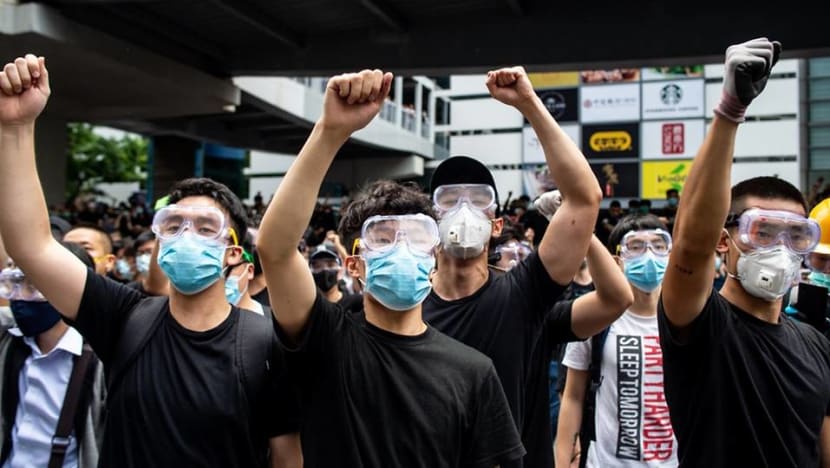
Protesters in masks and goggles chant slogans outside the Legislative Council in Hong Kong on Jun 12, 2019. (Photo: AFP/Philip Fong)
SINGAPORE: Massive protests in Hong Kong came to an end on Monday (Jun 17) after Chief Executive Carrie Lam withdrew the extradition bill and apologised, to huge relief among many.
For more than a week, as fiery accusations of the use of force flew between police and protesters, and nearly 80 were injured, the impasse looked set to continue as both sides dug their heels in.
The situation was also complicated by allegations of foreign meddling percolating through the media.
The city seems to have welcomed the move to calm the situation, after protesters ended their occupation of a major highway outside parliament in response to Lam's statements.
READ: In full: Carrie Lam's speech as Hong Kong's controversial extradition Bill is suspended
But resentment continues to stir beneath this peace, with many calls for the chief executive's resignation.
HOW CONTENTIOUS WERE THE EXTRADITION BILL’S TERMS?
Framing their arguments as one of human rights and the preservation of the principle of “One Country Two Systems”, critics have said the extradition bill would erode Hong Kong’s autonomy by opening the door for its residents to be prosecuted by Beijing.
But Lam’s administration and its supporters have highlighted the principle of justice, safeguards and the fact that the administration had consulted and raised the thresholds for extraditable offences after being lobbied vigorously.
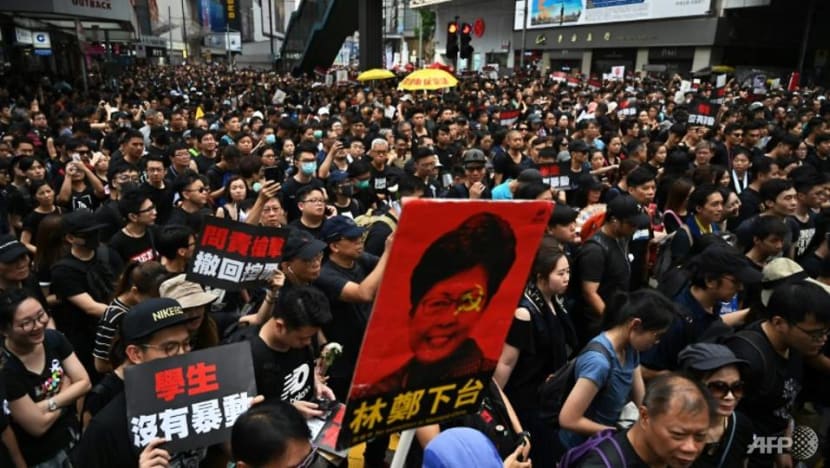
On the surface, the proposed extradition process seems to provide for checks and balances with recourse to the local judicial system for mediation.
If it had been passed, it would have required cases to be scrutinised by the Hong Kong’s Department of Justice before they are submitted to the chief executive for a decision.
Even then, the suspect could apply for judicial review and for the case to be heard in the Hong Kong courts. He or she would also be able petition the chief executive to reject the extradition request.
WANING CONFIDENCE IN INSTITUTIONS
But context is important. The passage of the bill took place against a backdrop of waning confidence in some circles in Hong Kong institutions and its leadership.
A May 2019 survey by the University of Hong Kong (HKU) suggests the city was witnessing its lowest levels of perceived judiciary fairness since 1997. Support for the Chief Justice is also at a five-year low.
Only 27 per cent of respondents were satisfied with Lam, while nearly half said they were dissatisfied, according to HKU’s Public Opinion Programme – marking a new low for the administration since she took over.
Having struggled with already low approval ratings since she started in her role, this was the lowest rating for any Hong Kong chief executive two years into the role - some of whom have had similar struggles to win over the hearts and minds of the population.
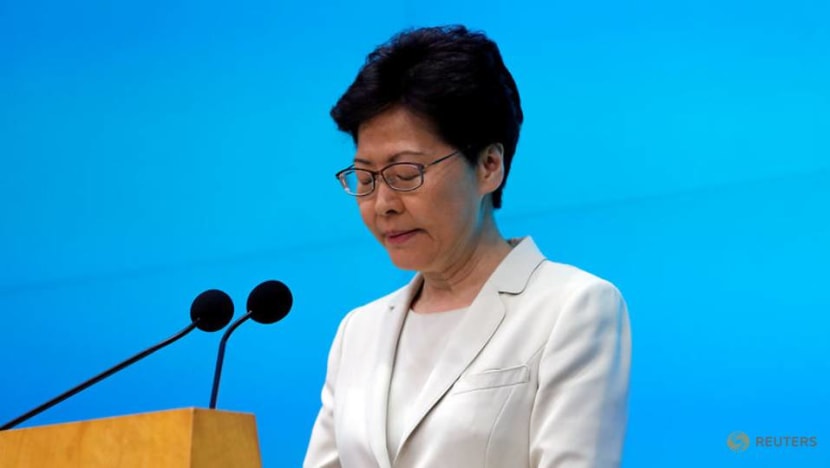
YOUTH CYNICISM
The picture gets even bleaker when one considers youth cynicism about the future.
Half of Hong Kong youth say they want to live elsewhere, according to a Chinese University of Hong Kong survey released in January. This proportion of those hoping to leave the city is highest for those aged 18 to 30, compared to just 21 per cent among those over 50.
No reasons were given by respondents for this, but commentators have suggested this disenchantment may be political in nature after many young protesters demanding a say in the election of the territory’s chief executive, culminating in the Occupy Central protests in 2014, did not manage to change outcomes – creating a stewing unhappiness that became a highly combustible mix ignited once again by the extradition bill.
READ: Closing the umbrella? The verdict on democracy in Hong Kong, a commentary
Stagnant starting salaries that barely keep up with rising costs of living may have also fanned the flames.
Think tank New Century Forum found just last year that Hong Kong University graduates are taking home pay less than their counterparts 30 years ago, with one in six having to settle for an unskilled job. The median monthly starting salary was HK$14,395 (US$1,837).
Observers have also said the down payment for a home is near impossible for young Hong Kong residents to meet, when mortgage loan guidelines have been tightened.
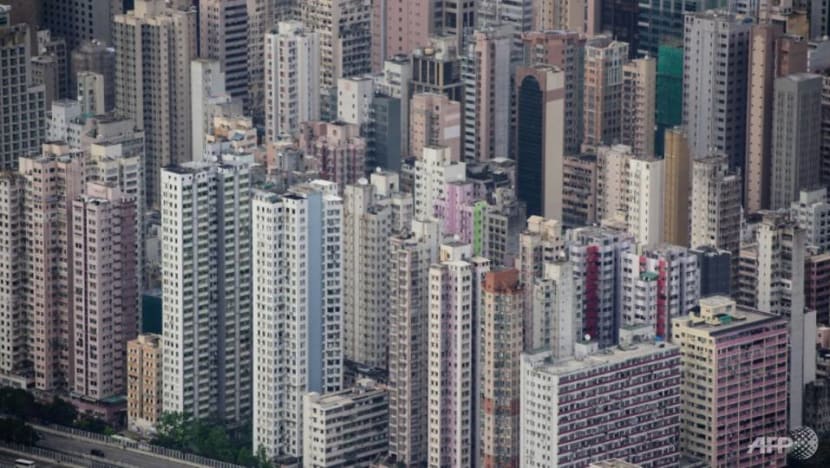
And property prices, which have soared by almost 70 per cent since 2014, could generate greater economic concerns among Hong Kong's population, given how the number of mainland Chinese investors who say they intend to purchase a Hong Kong property in the next two years has almost doubled, according to a UBS survey in May.
READ: The invisibility of the poor in Crazy Rich Hong Kong, a commentary
A LOOMING DIVIDE
For now, Lam’s statement that she would postpone the law indefinitely has restored calm.
But the worry is if these divides, whether between unhappy youths battling challenging economic headwinds on the one hand and an older population that has benefitted from Hong Kong’s astronomical rise on the other, or between younger liberals who want more autonomy versus older conservatives, are left to harden.
Despite the massive demonstrations last week, some online petitions supporting the passage of the extradition bill claim to have gotten almost a million signatures.
If these divisions become entrenched, the distrust sown could make compromise on other public policy issues where people have differing views very difficult, beyond this narrow flashpoint of the extradition bill.
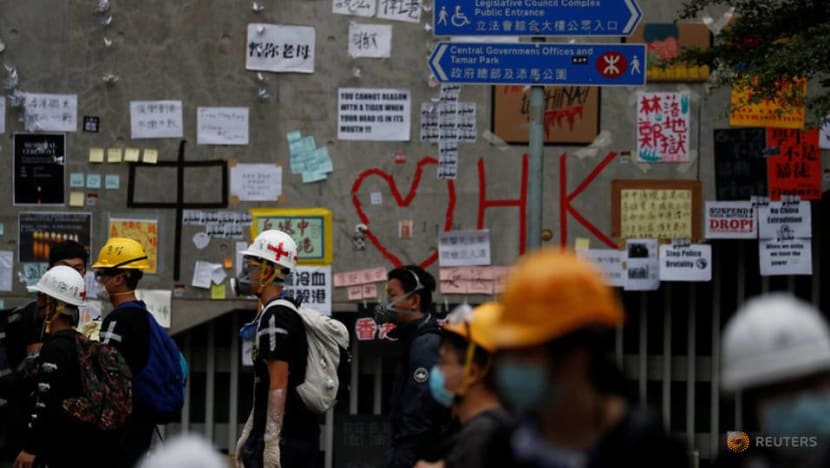
READ: Many in Hong Kong, fearful of China's grasp, flee to Taiwan
The cost could be economic too if demonstrations become the order of the day whenever segments disagree on issues. Many companies last week saw young employees take time off to march in the streets.
There's no telling if the current calm is simply a short lull rather than a sustained pause. There are messages circulating on social media and private messaging platforms in Hong Kong calling for radical action after some protesters remain dissatisfied that Lam had not completely retracted the bill.
“As a free, open and pluralistic society, Hong Kong needs such a spirit of mutual respect and harmony in diversity,” Lam said in her address on Saturday.
Indeed. Both sides will need to work hard to restore trust after the protests last week.
Lin Suling is executive editor at CNA Digital News where she oversees the Commentary section and hosts The Pulse podcast.














